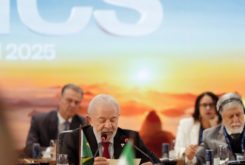There has been a lot of discussion whether Brazil will have to choose between China and the U.S. as its main trading partner. Yet despite Brazilian President Jair Bolsonaro’s praise of his U.S. counterpart and anti-Chinese rhetoric in the run-up to his election victory, Brazil’s thirst for foreign investment and increased trade is likely to see Brasilia maintain its economic ties with Beijing.
Before coming to power, Bolsonaro campaigned on a platform of opposition to growing Chinese involvement in the Brazilian economy, arguing that it posed a threat to national security but has since distanced himself from this stance. He said: “The Chinese are not buying in Brazil. They are buying Brazil.” Despite his desire for less state control and privatisation, Bolsonaro opposed the sale of some of state power utility Eletrobras’ assets because he feared that Chinese companies would buy them.
Many of his fears seemed to centre on energy sector acquisitions. State Grid Corporation of China bought a majority stake in CPFL Energia for 17.36 billion reais ($4.90 billion) last year, while China Three Gorges Corporation bought two Brazilian hydro schemes for 13.8 billion reais ($3.66 billion) in 2016. Relations with Beijing have also been affected by his visit to Taiwan in February 2018, making him the first Brazilian president to travel to the island. The Chinese embassy in Brazil described the trip as an “affront to the sovereignty and territorial integrity of China”.
Apart from economic nationalism and ideological differences, the Brazilian president may be seeking to put some distance between his government and those of his predecessors. The previous left-wing governments had seen Brasilia encourage trade with its fellow BRICS nations and strengthen economic relations with the rest of Latin America.
Bolsonaro is an avowed admirer of U.S. President Donald Trump and is often described as being made in the same mould: as a populist often more ready to whip up right wing sentiment via Twitter than devote the hard hours required to produce thoughtful political policy. He certainly has a similar style to Trump, attacking news outlets that criticise him, positioning himself as a political outsider and doubting the science behind climate change. Bolsonaro has spoken of his desire for “a new era of closer ties” with the United States.
For his part, Trump is keen to secure allies in his trade war with Beijing and also to intensify efforts to bring about a change of government in Venezuela, so he can take advantage of the close ties between the Venezuelan and Brazilian militaries. It has been reported that Washington has tried to limit the extent of Brazil’s deals with China. As with other countries, the U.S. is reported to have warned the Brazilian government against entrusting Chinese firm Huawei with too much influence over its telecoms infrastructure.
Washington talks
The first big test of any new relationship between the U.S. and Brazil came in March, when Bolsonaro and his Economy Minister Paulo Guedes visited Washington for talks with President Trump. In the run-up to the meeting, Bolsonaro was fulsome in his praise for the U.S. “The American people have always been an inspiration for me. We have good relationships around the world but I am extending my hands so that the relationship with the United States is increasingly more important”, he said.
Bolsonaro tweeted: “For the first time in a long time, a Brazilian President who is not anti-American arrives in Washington…It is the beginning of a partnership for freedom and prosperity, as Brazilians have always wanted.” However, the expected pivot towards the U.S. and away from China did not materialise, partly because of the lack of U.S. concessions and the desire for Chinese investment and trade.
The visit was highly symbolic but appeared to yield few concrete benefits for Brazil. The consensus in Brazil was that the government had failed to secure the desired concessions from Washington, including lower tariffs on Brazilian sugar exports to the U.S. and an end to the ban on Brazilian beef exports, although Bolsonaro did secure the right for the Brazilian military to buy U.S. military equipment at a discount. For its part, Brasilia did grant U.S. wheat producers tariff-free access to Brazil for up to 750,000 tonnes a year. Brazil has agreed to lift visa requirements on U.S. visitors but no such concession was forthcoming in the opposite direction.
The U.S. has demanded that Brazil give up its ‘developing country’ status at the World Trade Organization in return for accession to the Organisation for Economic Cooperation and Development (OECD). On the face of it, this seems reasonable given that OECD membership is generally equated with more developed economies.
Guedes said that Bolsonaro’s efforts to strengthen economic ties with the United States will not mean it turns away from China. Speaking to the U.S. Chamber of Commerce in Washington, he said: “We do not need to reduce exposure to China; we need to trade with everyone. You’ve been trading with China for decades, so why can’t we trade with them, why can’t we let them invest in infrastructure? If someone offers us a better deal we will accept, we will sell.” The Economy Minister warned that China was ready to take advantage if the U.S. failed to make any concessions.
Thirst for Chinese investment and trade
At the same time, Brazil needs strong economic ties with China. The latter has been Brazil’s most important trading partner for a decade, while Chinese companies have invested $124 billion in Brazil since 2003 and bilateral trade between the two countries stood at US$113 billion in 2018. The first few months will be crucial for a Bolsonaro government still trying to pull the country out of an economic slowdown and battling with a national debt of $4.3 trillion reais (US$1.1 trillion).
China accounted for 28% of Brazilian exports in 2018, with oil the most important commodity. Petrobras shipped two-thirds of its crude oil exports to China last year, while China’s total crude imports from Brazil increased by 37% year-on-year to 635,000 b/d. Figures from the first quarter of 2019 suggest that volumes are continuing to rise as China seeks to replace falling output in Venezuela. The range of Chinese investors in the country includes State Grid, China Three Gorges, China Construction Bank and Shaanxi Automobile Group amongst others.
The Brazilian leader may have been influenced by his country’s biggest mining companies. Vale, which is the world’s biggest iron ore producer, relies on Chinese demand. In addition, Bolsonaro may have been persuaded to tone down his anti-Chinese rhetoric by the Brazilian agricultural sector, which generally supports him but which is also heavily reliant on the Chinese market and so wants good relations with Beijing.
As previously examined on CLBrief, Brazilian farmers are expected to replace much of the U.S. soya production affected by tariffs imposed on imports into China as part of the Sino-U.S. trade war. U.S. soya exports to China fell by 50% last year, while Brazilian exports jumped 28%. This should boost Brazil export revenues but also threatens to unleash a new round of deforestation in the Amazon, as farmers seek new agricultural land.
U.S. and Chinese firms, among others, are certain to be interested in the possibility of a wide ranging Brazilian privatisation programme. In his Washington speech, Guedes said of Brazilian businesses: “Not only are state owned enterprises not functioning efficiently, but hampering the growth of private investment. Public investments collapse, because of their own weight in the budget.”
The Chinese view
Beijing appears to be taking a pragmatic view of relations with Brazil. The two are unlikely ever to enjoy a warm relationship while Bolsonaro is in power but Beijing needs Brazilian raw materials and is unlikely to welcome any diplomatic or economic conflict at a time of uncertain domestic economic growth and the imposition of new duties on its exports to the U.S. The new Chinese ambassador to Brazil, Yang Wanming, said that his government was happy to negotiate new trade arrangements with Brasilia, including a double taxation agreement.
In an interview with Bloomberg at the end of March, the ambassador described relations with Brazil as “mature, stable, healthy and dynamic” He added: “The new government has been clear that it will follow the spirit of contract law and the guidance of the market to promote even more trade and investment between Brazil and China.” Bolsonaro has now accepted an invitation to visit China sometime in the second half of this year.
It is also possible that Bolsonaro’s anti-China stance was designed more for domestic popular consumption than the result of personal conviction. Just a week after his electoral victory, he met with the then Chinese ambassador Li Jinzhang and described China as a “great cooperation partner”. The President may also be trying to avoid external confrontation when he is likely to be facing a wide range of challenges at home. He is already on a collision course with Congress over planned pension reforms.
On balance, Brasilia would be advised to avoid choosing between Washington and Beijing. The more foreign companies are interested in investing in Brazil, and the more foreign governments seek to strengthen their economic relationships with Brasilia, the better. A broader range of relationships will encourage competition for Brazilian assets and drive up prices for Brazilian raw materials.



